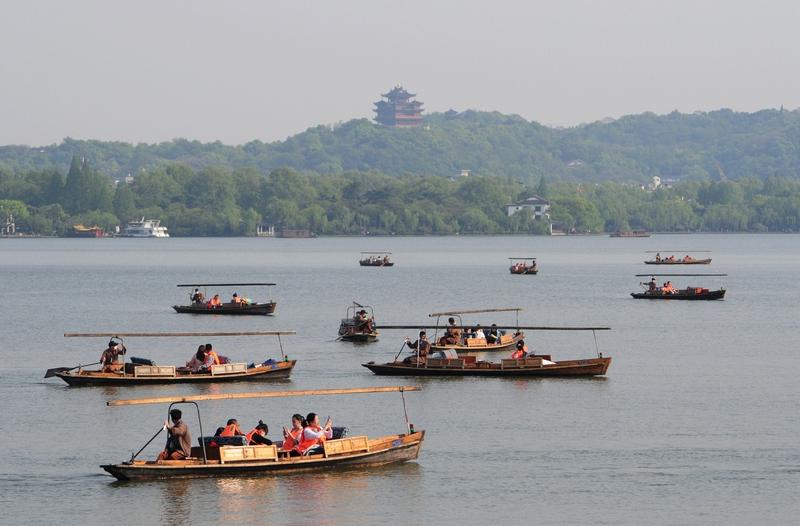 Visitors enjoy the scenery on West Lake in Hangzhou, Zhejiang province, on Monday. (LIAN GUOQING / FOR CHINA DAILY)
Visitors enjoy the scenery on West Lake in Hangzhou, Zhejiang province, on Monday. (LIAN GUOQING / FOR CHINA DAILY)
The central government will tighten up management of domestic tourist attractions to ensure orderly control and prevention work for COVID-19, according to a notice released on Monday.
During the recent Tomb Sweeping Day holiday, some attractions experienced a surge in the number of travelers whose desire for trips intensified after being quarantined for two months
During the recent Tomb Sweeping Day holiday, some attractions experienced a surge in the number of travelers whose desire for trips intensified after being quarantined for two months, increasing pressure on local governments to boost control and prevention work.
Huangshan Mountain in Anhui province, for example, was crowded with visitors during the holiday, compelling its management committee to post notices on social media reminding travelers of the situation.
The attraction was later closed temporarily as the number of travelers reached its daily limit of 20,000. Nearby attractions such as the ancient villages Xidi and Hongcun also almost reached capacity.
The notice, issued by the Ministry of Culture and Tourism and National Health Commission, stressed that attractions are allowed to receive 30 percent of their maximum visitor capacity. Paid scenic spots are required to evaluate the results before launching preferential policies for tickets and entertainment programs.
In addition, indoor venues will be temporarily closed amid the outbreak.
According to the notice, attractions should strengthen management over the flow of visitors. Reservations are required and travelers are encouraged to visit scenic spots at different times to reduce risks of infection.
The notice said that all levels of culture and tourism departments and attractions should also better control traffic to limit the number of travelers.
ALSO READ: Nine regions launch survey of coronavirus
Attractions can organize staff to check body temperatures and help register travelers' information at entrances, exits and areas where people may gather.
Promotion is also important to help visitors behave in a civilized manner and to enhance their awareness of prevention efforts.
The tourism industry, which was hard-hit by COVID-19, has been gradually recovering thanks to government support and special offers by travel agencies.
For example, domestic attractions received about 43 million visits during the three-day Tomb Sweeping Day holiday, though that was 61.4 percent lower than the same period last year.
"I'm very much looking forward to a trip after staying at home for over two months," said Lin Qiu, a 28-year-old from Shanghai. "I can understand those people who flocked to attractions during the holiday. It's a good signal for the tourism industry."
She said that she would postpone her trip as health is more important.
READ MORE: Chinese mainland reports 46 new confirmed COVID-19 cases
"I think things will be better after the government takes stricter measures to control the numbers of visitors at attractions. It will be much safer with fewer people gathering."
Zhan Dongmei, a researcher from the China Tourism Academy, said in an interview with Xinhua News Agency that the fight against COVID-19 is not yet finished, and the nation still faces risks of imported cases.
Attractions and tourism-related companies should make travelers' health and safety the top priority when they resume operations, Zhan said.


